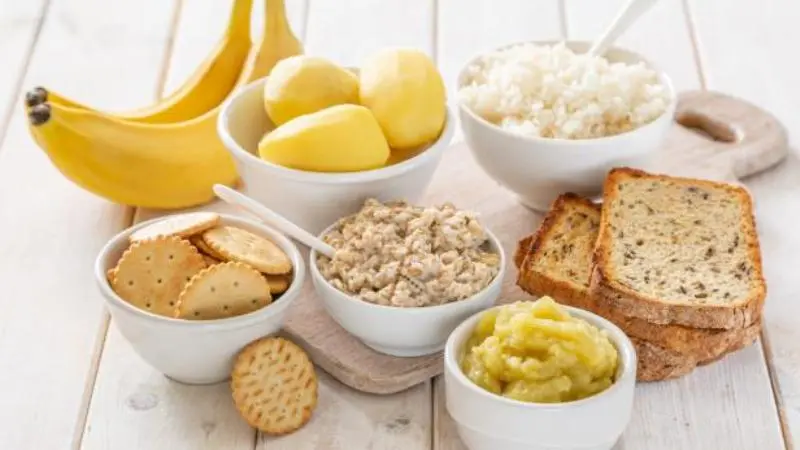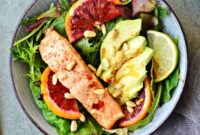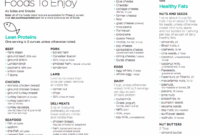The Southwest Beach Diet offers a unique approach to weight management, blending elements of low-carbohydrate and Mediterranean diets. This approach emphasizes lean proteins, healthy fats, and plenty of fresh vegetables and fruits, promising both weight loss and improved overall health. Understanding its principles, nutritional aspects, and potential risks is crucial for anyone considering this dietary plan. This guide will delve into the details, providing a comprehensive overview of the Southwest Beach Diet.
This dietary approach stands apart from other popular diets by focusing on the specific combination of nutrient-rich foods found in the Southwest region of the United States and the Mediterranean. This emphasis on fresh ingredients, lean proteins, and healthy fats allows for a varied and flavorful eating experience while supporting weight loss goals. The diet’s structure, encompassing macronutrient balance and a phased approach, makes it a potentially sustainable option for long-term health improvement.
Defining the “Southwest Beach Diet”
The Southwest Beach Diet, unlike many restrictive diets, emphasizes a balanced approach to weight loss by focusing on nutrient-rich foods found in Southwestern cuisine. It’s less about strict calorie counting and more about making smart food choices that promote satiety and overall well-being. The diet encourages the consumption of lean protein, healthy fats, and plenty of vegetables, while limiting processed foods, refined carbohydrates, and sugary drinks.
Core Principles of the Southwest Beach Diet
The Southwest Beach Diet’s core principles revolve around consuming whole, unprocessed foods that are naturally low in carbohydrates and high in protein and healthy fats. This approach aims to stabilize blood sugar levels, reduce cravings, and promote a feeling of fullness, making weight management more sustainable. The diet encourages mindful eating, paying attention to hunger and fullness cues, rather than relying on rigid meal timing or portion control rules. It also prioritizes regular physical activity to support weight loss and overall health.
Key Food Groups Emphasized
The diet heavily emphasizes lean protein sources such as fish, chicken, beans, and lean meats. Healthy fats from avocados, nuts, seeds, and olive oil are also crucial components. A significant portion of the diet consists of a wide variety of colorful vegetables, including bell peppers, onions, zucchini, and leafy greens. Fruits, especially berries, are included in moderation. Whole grains, such as quinoa and brown rice, are permitted, but in smaller quantities compared to other food groups.
Comparison with Other Popular Diets
Unlike low-fat diets that restrict healthy fats, the Southwest Beach Diet incorporates them as an essential part of a balanced meal plan. Compared to ketogenic diets, which drastically limit carbohydrate intake, the Southwest Beach Diet allows for a moderate intake of complex carbohydrates from whole grains and vegetables. It differs from restrictive diets like the cabbage soup diet by focusing on a variety of nutrient-rich foods rather than a limited selection. It emphasizes a more sustainable and balanced approach compared to quick-fix diets that often lead to weight regain.
Typical Daily Meal Plan
A typical daily meal plan on the Southwest Beach Diet might include a breakfast of scrambled eggs with vegetables and a small portion of whole-wheat toast, a lunch of grilled chicken salad with avocado and a light vinaigrette, and a dinner of baked salmon with roasted vegetables and a small portion of quinoa. Snacks could include a handful of almonds, berries, or a small piece of fruit. Portion sizes are adjusted to individual needs and caloric goals.
Sample Weekly Menu
The following is a sample weekly menu illustrating the principles of the Southwest Beach Diet. It is important to remember that this is a sample, and individual needs and preferences should be considered when creating a personal meal plan.
| Day | Breakfast | Lunch | Dinner |
|---|---|---|---|
| Monday | Scrambled eggs with spinach and mushrooms | Chicken salad with avocado and mixed greens | Grilled fish with roasted broccoli and sweet potatoes |
| Tuesday | Greek yogurt with berries and a sprinkle of nuts | Leftover grilled fish and vegetables | Chicken fajitas (using whole-wheat tortillas in moderation) with bell peppers and onions |
| Wednesday | Oatmeal with berries and a small amount of nuts | Lentil soup with a side salad | Turkey meatballs with zucchini noodles and marinara sauce |
| Thursday | Smoothie with spinach, berries, and protein powder | Tuna salad (made with avocado instead of mayonnaise) on whole-wheat crackers | Pork tenderloin with roasted asparagus and a small baked potato |
| Friday | Breakfast burrito with scrambled eggs, black beans, and salsa | Leftover pork tenderloin and vegetables | Shrimp scampi with zucchini noodles |
| Saturday | Omelet with vegetables and cheese | Salad with grilled chicken or fish | Steak with a large salad |
| Sunday | Pancakes made with whole-wheat flour and topped with berries | Leftover steak and salad | Chicken and vegetable stir-fry |
Nutritional Aspects of the Southwest Beach Diet
The Southwest Beach Diet, while not explicitly defining precise macronutrient ratios, emphasizes a balance of lean protein, healthy fats, and moderate carbohydrate intake, primarily from fruits, vegetables, and whole grains. This approach differs from some low-carb diets by allowing for a wider range of carbohydrate sources, contributing to a more sustainable and potentially less restrictive eating pattern.
Macronutrient Breakdown
The Southwest Beach Diet doesn’t prescribe exact percentages, but generally promotes a higher intake of protein compared to many traditional diets. This is achieved through the inclusion of lean meats, poultry, fish, beans, and lentils. Healthy fats, primarily from avocados, nuts, seeds, and olive oil, also play a significant role. Carbohydrate intake is moderate, focusing on complex carbohydrates found in whole grains, fruits, and vegetables, rather than refined carbohydrates. The overall ratio is flexible and adapts to individual needs and preferences, emphasizing whole, unprocessed foods.
Potential Nutritional Benefits
The emphasis on lean protein contributes to satiety, potentially aiding in weight management. The abundance of fruits and vegetables provides a rich source of vitamins, minerals, and antioxidants, promoting overall health and reducing the risk of chronic diseases. The inclusion of healthy fats supports hormone production and brain function. The moderate carbohydrate intake helps avoid the blood sugar spikes and crashes associated with high-carbohydrate diets.
Potential Nutritional Deficiencies
Restricting certain food groups, even moderately, can potentially lead to nutrient deficiencies. If not carefully planned, the Southwest Beach Diet may lack sufficient calcium and vitamin D if dairy products are significantly limited. Similarly, individuals may need to be mindful of their intake of iron and B vitamins, especially if they restrict red meat consumption. Careful meal planning and potential supplementation should be considered to mitigate these risks.
Vitamins and Minerals in Southwest Beach Diet Foods
Many foods central to the Southwest Beach Diet are rich in essential vitamins and minerals. Avocados are a good source of Vitamin K and folate. Leafy greens like spinach and kale provide Vitamins A, C, and K, along with iron and calcium. Beans and lentils are excellent sources of iron, folate, and fiber. Salmon and other fatty fish offer Vitamin D and omega-3 fatty acids. Bell peppers are rich in Vitamin C. This diverse range of foods helps ensure a broad spectrum of nutrient intake.
Nutritional Content Comparison of Key Foods
| Food | Protein (g/serving) | Fat (g/serving) | Carbohydrate (g/serving) |
|---|---|---|---|
| Grilled Chicken Breast (4oz) | 30 | 3 | 0 |
| Avocado (1/2) | 2 | 15 | 7 |
| Black Beans (1 cup cooked) | 15 | 1 | 40 |
| Salmon (4oz) | 25 | 17 | 0 |
Health Implications and Potential Risks
The Southwest Beach Diet, like any restrictive eating plan, presents both potential benefits and risks. Understanding these aspects is crucial for making an informed decision about whether or not to adopt this dietary approach. While it emphasizes whole, unprocessed foods, its restrictive nature necessitates careful consideration of its potential impact on overall health.
Weight Management Effects
The Southwest Beach Diet’s emphasis on lean protein, healthy fats, and limited carbohydrates can lead to weight loss, primarily through a calorie deficit. The high protein content promotes satiety, reducing overall caloric intake. The restriction of processed foods and sugary drinks also contributes to weight management. However, the sustainability of this weight loss depends on long-term adherence to the diet’s principles. Rapid weight loss, while initially appealing, can also lead to muscle loss and metabolic slowdown. A gradual, sustainable approach is generally recommended for long-term health and weight management.
Impact on Blood Sugar and Insulin Sensitivity
The low-carbohydrate nature of the Southwest Beach Diet may initially improve blood sugar control and insulin sensitivity in some individuals, particularly those with insulin resistance or type 2 diabetes. The reduced intake of refined carbohydrates and sugary foods leads to less fluctuation in blood glucose levels. However, long-term effects on blood sugar and insulin sensitivity are not definitively established and may vary depending on individual metabolic responses and adherence to the diet. For individuals with pre-existing diabetes or metabolic conditions, consulting a physician before adopting this diet is essential.
Potential Risks and Side Effects
Potential risks associated with the Southwest Beach Diet include nutrient deficiencies due to its restrictive nature. Limiting certain food groups can lead to insufficient intake of essential vitamins and minerals. Constipation is another common side effect due to the low fiber content if not carefully managed through increased water intake and inclusion of fiber-rich vegetables. Furthermore, the restrictive nature of the diet may lead to social isolation and disordered eating patterns in some individuals. The potential for the “keto flu,” characterized by headaches, fatigue, and nausea, is also possible during the initial adaptation phase as the body shifts to ketosis.
Potential Long-Term Health Consequences
Long-term adherence to a very restrictive diet like the Southwest Beach Diet may lead to several potential health consequences. Nutrient deficiencies, if prolonged, can result in various health problems, including weakened immunity, bone loss, and fatigue. The lack of variety in the diet can also lead to decreased satiety over time, making it difficult to maintain the weight loss achieved. Moreover, the potential for disordered eating patterns, including orthorexia (an obsession with healthy eating), should be considered. The sustainability of any diet is key, and the Southwest Beach Diet’s restrictive nature may pose challenges for long-term adherence.
Potential Risks and Benefits Summary
| Aspect | Potential Benefits | Potential Risks | Considerations |
|---|---|---|---|
| Weight Management | Weight loss through calorie restriction and increased satiety. | Rapid weight loss, muscle loss, metabolic slowdown. | Gradual weight loss is preferable. |
| Blood Sugar Control | Improved blood sugar control and insulin sensitivity in some individuals. | Unpredictable long-term effects, potential for nutrient deficiencies. | Consult a physician, especially if diabetic. |
| Nutrient Intake | Increased intake of healthy fats and lean protein. | Potential deficiencies in vitamins, minerals, and fiber. | Careful planning and supplementation may be necessary. |
| Overall Health | Potential for improved heart health (if combined with exercise). | Constipation, “keto flu,” social isolation, disordered eating patterns. | Monitor health closely and seek professional guidance. |
Closing Notes
Ultimately, the Southwest Beach Diet presents a potentially effective strategy for weight loss and improved well-being, but individual results may vary. Careful consideration of potential risks, coupled with a commitment to the dietary guidelines and a healthy lifestyle, is paramount. Remember to consult with a healthcare professional or registered dietitian before making significant dietary changes to ensure it aligns with your specific health needs and goals. Success with the Southwest Beach Diet hinges on informed choices, consistent effort, and a personalized approach.




